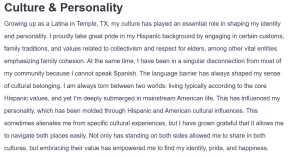Culture & Personality
Growing up as a Latina in Temple, TX, my culture has played an essential role in shaping my identity and personality. I proudly take great pride in my Hispanic background by engaging in certain customs, family traditions, and values related to collectivism and respect for elders, among other vital entities emphasizing family cohesion. At the same time, I have been in a singular disconnection from most of my community because I cannot speak Spanish. The language barrier has always shaped my sense of cultural belonging. I am always torn between two worlds: living typically according to the core Hispanic values, and yet I’m deeply submerged in mainstream American life. This has influenced my personality, which has been molded through Hispanic and American cultural influences. This sometimes alienates me from specific cultural experiences, but I have grown grateful that it allows me to navigate both places easily. Not only has standing on both sides allowed me to share in both cultures, but embracing their value has empowered me to find my identity, pride, and happiness.
My personality may have taken a completely different turn if I had grown up in a vastly different culture, such as Japan. According to Shen et al. (2024), the cultural dimension exhibited by Japanese society stresses social harmony, group cohesion, and indirect communication. In contrast, American culture has a straightforward method of communication and individualism. Set amidst such a backdrop, my assertiveness, independence, and expression of individuality would run against the grain of cultural emphasis on restraint and consensus among a group. These differences remind me how culture can significantly shape personality, which affects one’s behaviors and takes a toll on the well-being and the development of identity in general.
In conclusion, culture is deeply connected with personality since it forms and influences individuals’ behavior, values, and identification. Navigating multiple cultures can enrich one’s identity by fostering a balance between traditions and modern society, promoting personal growth and a better understanding of oneself.
References
Shen, Z., Pang, N. B., Li, N. X., & Chen, N. Y. (2024). An exploration of Japanese cultural dynamics communication practices through social pragmatics. Journal of Pragmatics and Discourse Analysis, 3(1), 60–72. https://doi.org/10.32996/jpda.2024.3.1.4
ORDER A PLAGIARISM-FREE PAPER HERE
We’ll write everything from scratch
Question
8-1 Discussion: Culture & Personality
PROMPT: For this discussion, explain how your own culture may have impacted your personality. Does your personality match your culture? If so, or if not, how has that impacted your happiness and lifestyle?
Secondly, research a culture very different from your own and briefly summarize it for us. Hypothetically, how might your personality be different if you were raised in that culture? If you were suddenly dropped into that culture, explain how well (or poorly) your personality would fit in that culture.

Culture & Personality
Reading Resources:
- Textbook: The Personality Puzzle, Chapter 12
- Consider the following questions as you read this chapter:
- What is your experience with other cultures, and is it possible to account for all variables in cross-cultural psychology?
- Do you think studying the universal human experiences enhances cross-cultural psychology?
- Consider the following questions as you read this chapter:
- The Well-Being Benefits of Person-Culture Match Are Contingent on Basic Personality Traits
- This article considers how well a person’s personality matches their culture and whether that impacts their sense of well-being.
- Personality Traits, Mental Abilities and Other Individual Differences: Monozygotic Female Twins Raised Apart in South Korea and the United States
- This twin study looked at different traits of identical twins raised in different countries, the United States and South Korea.

